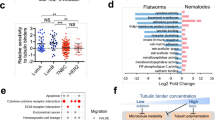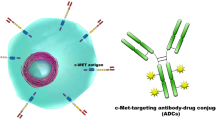Abstract
Purpose
The clinical efficacy of the anaplastic lymphoma kinase (ALK) inhibitor crizotinib has been demonstrated in ALK fusion-positive non-small cell lung cancer (NSCLC); however, brain metastases are frequent sites of initial failure in patients due to poor penetration of the central nervous system by crizotinib. Here, we examined the efficacy of a selective ALK inhibitor alectinib/CH5424802 in preclinical models of intracranial tumors.
Methods
We established intracranial tumor implantation mouse models of EML4–ALK-positive NSCLC NCI-H2228 and examined the antitumor activity of alectinib in this model. Plasma distribution and brain distribution of alectinib were examined by quantitative whole-body autoradiography administrating a single oral dose of 14C-labeled alectinib to rats. The drug permeability of alectinib was evaluated in Caco-2 cell.
Results
Alectinib resulted in regression of NCI-H2228 tumor in mouse brain and provided a survival benefit. In a pharmacokinetic study using rats, alectinib showed a high brain-to-plasma ratio, and in an in vitro drug permeability study using Caco-2 cells, alectinib was not transported by P-glycoprotein efflux transporter that is a key factor in blood–brain barrier penetration.
Conclusions
We established intracranial tumor implantation models of EML4–ALK-positive NSCLC. Alectinib showed potent efficacy against intracranial EML4–ALK-positive tumor. These results demonstrated that alectinib might provide therapeutic opportunities for crizotinib-treated patients with brain metastases.




Similar content being viewed by others
References
Soda M, Choi YL, Enomoto M et al (2007) Identification of the transforming EML4–ALK fusion gene in non-small-cell lung cancer. Nature 448:561–566
Shaw AT, Kim DW, Nakagawa K et al (2013) Crizotinib versus chemotherapy in advanced ALK-positive lung cancer. N Engl J Med 368:2385–2394
Camidge DR, Doebele RC (2012) Treating ALK-positive lung cancer–early successes and future challenges. Nat Rev Clin Oncol 9:268–277
Mujoomdar A, Austin JH, Malhotra R et al (2007) Clinical predictors of metastatic disease to the brain from non-small cell lung carcinoma: primary tumor size, cell type, and lymph node metastases. Radiology 242:882–888
Zimm S, Wampler GL, Stablein D, Hazra T, Young HF (1981) Intracerebral metastases in solid-tumor patients: natural history and results of treatment. Cancer 48:384–394
Weickhardt AJ, Scheier B, Burke JM et al (2012) Continuation of EGFR/ALK inhibition after local therapy of oligoprogressive disease in EGFR mutant (Mt) and ALK + non-small cell lung cancer (NSCLC). J Clin Oncol 30:suppl; abstr 7526
Sakamoto H, Tsukaguchi T, Hiroshima S et al (2011) CH5424802, a selective ALK inhibitor capable of blocking the resistant gatekeeper mutant. Cancer Cell 19:679–690
Seto T, Kiura K, Nishio M et al (2013) CH5424802 (RO5424802) for patients with ALK-rearranged advanced non-small-cell lung cancer (AF-001JP study): a single-arm, open-label, phase 1–2 study. Lancet Oncol 14:590–598
Kuromitsu S, Mori M, Shimada I et al (2011) Anti-tumor activity of ASP3026, —a novel and selective ALK inhibitor. Cancer Res 71:suppl; abstract 2821
Mealey KL, Greene S, Bagley R et al (2008) P-glycoprotein contributes to the blood-brain, but not blood-cerebrospinal fluid, barrier in a spontaneous canine p-glycoprotein knockout model. Drug Metab Dispos 36:1073–1079
Bartels AL, Kortekaas R, Bart J et al (2009) Blood-brain barrier P-glycoprotein function decreases in specific brain regions with aging: a possible role in progressive neurodegeneration. Neurobiol Aging 30:1818–1824
US FDA. (2012) Guidance for industry. Drug interaction studies—study design, data analysis, and implications for dosing and labeling recommendations, Rockville, USA
Kodama T, Tsukaguchi T, Yoshida M, Kondoh O, Sakamoto H (2014) Selective ALK inhibitor alectinib with potent antitumor activity in models of crizotinib resistance. Cancer Lett 351:215–221
Tan W, Wilner KD, Bang Yet al (2010) Pharmacokinetics (PK) of PF-02341066, a dual ALK/MET inhibitor after multiple oral doses to advanced cancer patients. J Clin Oncol 28:suppl; abstr 2596
Pfizer Inc. XALKORI® (crizotinib) Capsules, oral. Prescribing information. New York, USA, 2011; Revised May 2013
Mori M, Ueno Y, Konagai S et al (2014) The selective anaplastic lymphoma receptor tyrosine kinase inhibitor ASP3026 induces tumor regression and prolongs survival in non-small cell lung cancer model mice. Mol Cancer Ther 13:329–340
Fushiki H, Saito R, Jitsuoka M et al (2013) First demonstration of in vivo PET imaging for ALK inhibitor using [11C]ASP3026, a novel brain-permeable type of ALK inhibitor. Cancer Res 73:suppl; abstr 2678
Costa DB, Kobayashi S, Pandya SS et al (2011) CSF concentration of the anaplastic lymphoma kinase inhibitor crizotinib. J Clin Oncol 29:e443–e445
Choi YL, Soda M, Yamashita Y et al (2010) EML4-ALK mutations in lung cancer that confer resistance to ALK inhibitors. N Engl J Med 363:1734–1739
Doebele RC, Pilling AB, Aisner DL et al (2012) Mechanisms of resistance to crizotinib in patients with ALK gene rearranged non-small cell lung cancer. Clin Cancer Res 18:1472–1482
Gainor JF, Varghese AM, Ou SH et al (2013) ALK rearrangements are mutually exclusive with mutations in EGFR or KRAS: an analysis of 1,683 patients with non-small cell lung cancer. Clin Cancer Res 19:4273–4281
Katayama R, Shaw AT, Khan TM et al (2012) Mechanisms of acquired crizotinib resistance in ALK-rearranged lung cancers. Sci Transl Med 4:120ra117
Sasaki T, Koivunen J, Ogino A et al (2011) A novel ALK secondary mutation and EGFR signaling cause resistance to ALK kinase inhibitors. Cancer Res 71:6051–6060
Sasaki T, Okuda K, Zheng W et al (2010) The neuroblastoma-associated F1174L ALK mutation causes resistance to an ALK kinase inhibitor in ALK-translocated cancers. Cancer Res 70:10038–10043
Ou SH, Gadgeel S, Chiappori A et al (2013) Safety and efficacy analysis of alectinib (CH5424802/RO5424802) in anaplastic lymphoma kinase (ALK)-positive non-small cell lung cancer (NSCLC) patients who have failed crizotinib in a dose finding phase I study (AF-002JG, NCT01588028). Ann Oncol:44 LBA
Acknowledgments
We thank T. Mizuno for the establishment of luciferase-expressing cells; A. Nakagawa and F. Sawamura for the in vivo experiments; and T. Shiga and K. Honda for the tissue-staining experiments.
Conflict of interest
All of the authors are employees of Chugai Pharmaceutical Co., Ltd.
Author information
Authors and Affiliations
Corresponding author
Additional information
Tatsushi Kodama and Masami Hasegawa have contributed equally to this work.
Rights and permissions
About this article
Cite this article
Kodama, T., Hasegawa, M., Takanashi, K. et al. Antitumor activity of the selective ALK inhibitor alectinib in models of intracranial metastases. Cancer Chemother Pharmacol 74, 1023–1028 (2014). https://doi.org/10.1007/s00280-014-2578-6
Received:
Accepted:
Published:
Issue Date:
DOI: https://doi.org/10.1007/s00280-014-2578-6




